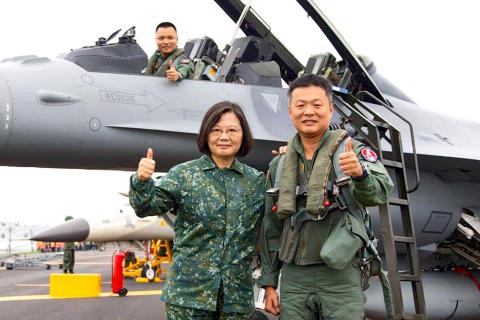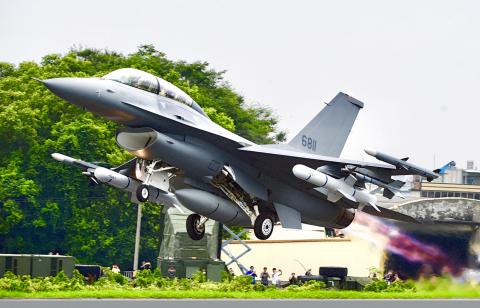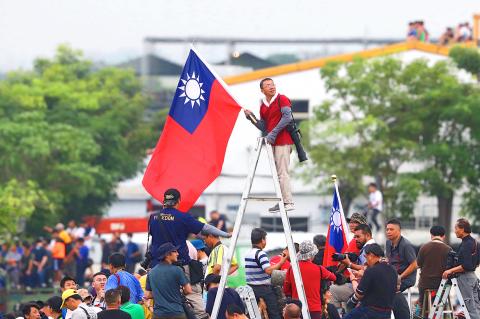The military yesterday displayed how its fighter jets can land, refuel and rearm on the nation’s highways for the first time in five years as part of the annual Han Kuang military exercises simulating defense against a Chinese invasion.
On Monday, the streets across northern Taiwan were briefly deserted as authorities carried out an annual missile drill, with text messages sent to every mobile phone and air raid sirens wailing.
Yesterday, 1,600 soldiers were mobilized in central Taiwan as aircraft practiced landing on a closed section of highway for the annual exercises.

Photo: Military News Agency
Three fighter jets, as well as an early warning aircraft, practiced refueling and loading missiles and other ammunition before taking off again.
An F-16V jet, a Mirage 2000-5, an Indigenous Defense Fighter and an E-2K airborne early warning aircraft landed on the Huatan section of the Sun Yat-sen Freeway (Freeway No. 1) in Changhua County at about 6am.
It was the first time an F-16V took part in the exercises.

Photo: Peter Lo, Taipei Times
The military is upgrading its 144 F-16A/B jets to F-16Vs as part of a US$3.68 billion project launched by the government in 2016.
The retrofit program involves installing advanced equipment on the fighters, including the AN/APG active electronically scanned array radar system used in the US’ F-22 and F-35 jets.
The comprehensive upgrade of the air force’s entire F-16 fleet is expected to be completed by the end of 2023, the air force has said.

Photo: CNA
“There are only a few military air bases [in Taiwan], which would become prime targets in the event of an attack. The highway drill is necessary, as highway strips would be our priority choice if the runways are damaged during a war,” air force Colonel Shu Kuo-mao (許國茂) told reporters.
Taiwan would be massively outgunned in terms of troop numbers and firepower in any war with China, but it has developed sophisticated asymmetric tactics to hold out for as long as possible and make any invasion of the nation very costly for Beijing.
President Tsai Ing-wen (蔡英文), who inspected the drill, commented on increased Chinese naval and air force patrols around Taiwan over the past few months.
“They have caused a certain degree of threat to regional peace and stability. We should maintain high vigilance,” Tsai said.
The exercises aim to test combat capabilities of all branches of the armed forces in the face of a continuing military threat from China.
They came after the US, Japan, South Korea and Australia last week launched operation “Pacific Vanguard” near Guam, bringing together more than 3,000 sailors from the four countries.
Beijing has also been angered by warming relations between Taipei and Washington since Tsai came to power in May 2016.
On Monday, Beijing reacted frostily to photographs showing a rare meeting between uniformed Taiwanese officers and their US counterparts earlier this month.
Last week, China lodged a protest with Washington after two US warships sailed through the Taiwan Strait.
Additional reporting by CNA

Conflict with Taiwan could leave China with “massive economic disruption, catastrophic military losses, significant social unrest, and devastating sanctions,” a US think tank said in a report released on Monday. The German Marshall Fund released a report titled If China Attacks Taiwan: The Consequences for China of “Minor Conflict” and “Major War” Scenarios. The report details the “massive” economic, military, social and international costs to China in the event of a minor conflict or major war with Taiwan, estimating that the Chinese People’s Liberation Army (PLA) could sustain losses of more than half of its active-duty ground forces, including 100,000 troops. Understanding Chinese

The Ministry of Foreign Affairs (MOFA) yesterday said it is closely monitoring developments in Venezuela, and would continue to cooperate with democratic allies and work together for regional and global security, stability, and prosperity. The remarks came after the US on Saturday launched a series of airstrikes in Venezuela and kidnapped Venezuelan President Nicolas Maduro, who was later flown to New York along with his wife. The pair face US charges related to drug trafficking and alleged cooperation with gangs designated as terrorist organizations. Maduro has denied the allegations. The ministry said that it is closely monitoring the political and economic situation

UNRELENTING: China attempted cyberattacks on Taiwan’s critical infrastructure 2.63 million times per day last year, up from 1.23 million in 2023, the NSB said China’s cyberarmy has long engaged in cyberattacks against Taiwan’s critical infrastructure, employing diverse and evolving tactics, the National Security Bureau (NSB) said yesterday, adding that cyberattacks on critical energy infrastructure last year increased 10-fold compared with the previous year. The NSB yesterday released a report titled Analysis on China’s Cyber Threats to Taiwan’s Critical Infrastructure in 2025, outlining the number of cyberattacks, major tactics and hacker groups. Taiwan’s national intelligence community identified a large number of cybersecurity incidents last year, the bureau said in a statement. China’s cyberarmy last year launched an average of 2.63 million intrusion attempts per day targeting Taiwan’s critical

AGING: As of last month, people aged 65 or older accounted for 20.06 percent of the total population and the number of couples who got married fell by 18,685 from 2024 Taiwan has surpassed South Korea as the country least willing to have children, with an annual crude birthrate of 4.62 per 1,000 people, Ministry of the Interior data showed yesterday. The nation was previously ranked the second-lowest country in terms of total fertility rate, or the average number of children a woman has in her lifetime. However, South Korea’s fertility rate began to recover from 2023, with total fertility rate rising from 0.72 and estimated to reach 0.82 to 0.85 by last year, and the crude birthrate projected at 6.7 per 1,000 people. Japan’s crude birthrate was projected to fall below six,